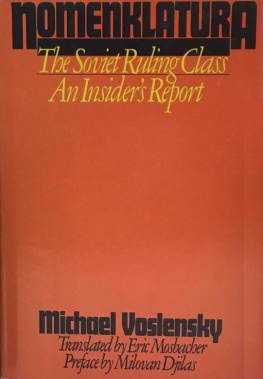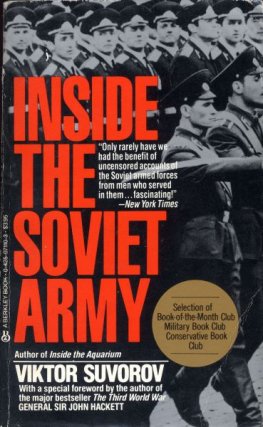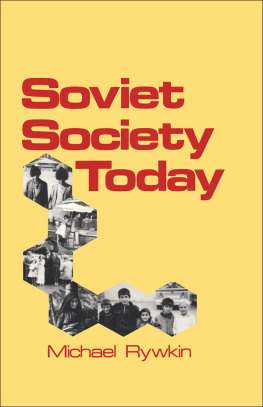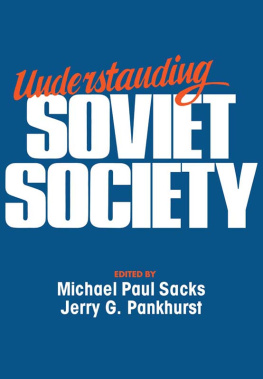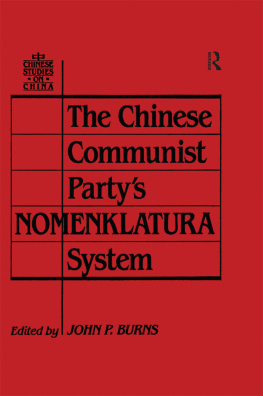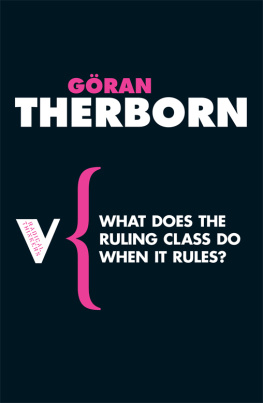Michael Voslensky - Nomenklatura : the Soviet ruling class
Here you can read online Michael Voslensky - Nomenklatura : the Soviet ruling class full text of the book (entire story) in english for free. Download pdf and epub, get meaning, cover and reviews about this ebook. City: Garden City, N.Y., year: 1984, publisher: Doubleday, genre: Politics. Description of the work, (preface) as well as reviews are available. Best literature library LitArk.com created for fans of good reading and offers a wide selection of genres:
Romance novel
Science fiction
Adventure
Detective
Science
History
Home and family
Prose
Art
Politics
Computer
Non-fiction
Religion
Business
Children
Humor
Choose a favorite category and find really read worthwhile books. Enjoy immersion in the world of imagination, feel the emotions of the characters or learn something new for yourself, make an fascinating discovery.
- Book:Nomenklatura : the Soviet ruling class
- Author:
- Publisher:Doubleday
- Genre:
- Year:1984
- City:Garden City, N.Y.
- Rating:5 / 5
- Favourites:Add to favourites
- Your mark:
- 100
- 1
- 2
- 3
- 4
- 5
Nomenklatura : the Soviet ruling class: summary, description and annotation
We offer to read an annotation, description, summary or preface (depends on what the author of the book "Nomenklatura : the Soviet ruling class" wrote himself). If you haven't found the necessary information about the book — write in the comments, we will try to find it.
Nomenklatura : the Soviet ruling class — read online for free the complete book (whole text) full work
Below is the text of the book, divided by pages. System saving the place of the last page read, allows you to conveniently read the book "Nomenklatura : the Soviet ruling class" online for free, without having to search again every time where you left off. Put a bookmark, and you can go to the page where you finished reading at any time.
Font size:
Interval:
Bookmark:
TRANSLATED BY
Eric Mosbacher
PREFACE BY MILOVAN DJILAS
DOUBLEDAY and COMPANY, INC
GARDEN CITY, NEW YORK
ISBN: 0-385-17657-0
1984
Editor's Note
Two forms of transliteration from Cyrillic to Greco-Roman lettering appear in the text which follows. Russian words appearing in the text of the chapters are transliterated using the common journalistic form of sound transliteration. In the notes to each chapter, Russian words appear using the Library of Congress transliteration system, which is more frequently utilized by scholars.
In memory of my father
Sergei Ivanovich Voslensky
and his indomitable love of liberty
Let me begin by expressing my great thanks to the individuals and institutions who helped me write this book and made its publication possible.
It is with deep gratitude that I think of Dr. Gustav W. Heinemann, President of the German Federal Republic, Frau Hilda Heinemann, his wife, and Dr. Walter Wodak, Secretary-General of the Austrian Foreign Ministry, all three of whom are dead, alas. My heartfelt thanks go to Professor Carl-Friedrich von Weizsacker, the founder and head of the Max Plank Institute at Stamberg, where I wrote this book; they go also to Herr Walter Hesselbach and Countess Marion Donhoff.
Voslensky's Nomenklatura belongs to the very rare books that need not wait to join the treasury of political reflections. Its time is right now, both due to its actuality and to its extraordinary qualities.
First of all, the book is well and perspicuously created. Step by step it guides the reader into special sectors of the Soviet system without losing sight of the system as a whole. The final picture develops successively, by itself, so to speak.
As a starting point, Voslensky offers the thesis: Even with the revolution in the Soviet Union, through the party a monopolistic privileged stratum was established, which through various phases of development has fortified and legalized its position. This stratum, which not only separated itself from society, from the people, and from the rest of the world, but also inwardly established hierarchical ranks and barriers - this is the Nomenklatura.
Other writers have called it "partyocracy," a "caste," the "new class," the "political bureaucracy" or "party bureaucracy." All refer to the same presence. No doubt the term "nomenklatura" is justified if one refers to the established hierarchical regime within the Soviet bureaucracy, the party bureaucracy, and the bureaucracies concomitant therewith.
Voslensky develops this thesis in detail, historically, statistically, theoretically, and on the basis of personal experience. He presents a comprehensive and complete picture of the Soviet system - a picture that is exhaustive, meticulous and well informed, one of the most complete, if not the most complete ever. In any case, it is the most up-to-date picture of the Soviet system, and therefore-in the light of the tense international situation-very instructive.
The book has special value due to its analytic quality and due to the objective, though not totally disengaged, spirit with which it is leavened. Voslensky does not hate, he does not accuse; even less does he curse or predict.
He describes and analyzes, simply, clearly, and in a documented manner. Voslensky is not driven by ideoloay or rebellion. but by realism and striving for the truth. Voslensky's Nomenklatura indisputably belongs to the best that has ever been written about the Soviet system.
Through its analytical and realistic manner, Nomenklatura gives cause for reflection and apprehension: how is the Soviet system constructed, where is it leading, and what dangers, particularly for Europe, does it bring in its train?
From the very beginning, the idea of power or dictatorship is innate to the Soviet system, in all its expressions. Lenin defines the state as a cudgel, an instrument for the creation of the new socialistic state and the "new socialist man."
This theory of course is based on Marx-on his doctrine of productive capacity and conditions as a foundation not only for the community but also for man and his existence. However, it digresses from Marx as it considers the revolution and the power - "the dictatorship of the proletariat" - as being the foundation of Marx's doctrine and not the abolition of inhuman, debasing, and depressing conditions.
With the principle of power as foundation of everything in the society, and the legalization of violence (Lenin: the dictatorship is a power that is not limited by any laws whatsoever), it was not possible to establish a society that would not tum those in power-the party bureaucracy, the nomenklatura - into a privileged and monopolistic caste. Lenin surely thought it would only be a temporary form that would disappear when the state "withers away." Already in 1918 Lenin - in a conversation with a labor delegation - approved of the fact that party activists received extra rations of food.
So, together with the power, the privileges increased and the state showed no signs of "withering away"; on the contrary, it grew stronger. Even after the "encirclement from the outside" during Lenin's time, a long time ago, had ceased and the "developed socialist society" had been established, the privileges grew stronger.
Bureaucracy does not limit its own privileges, instead it increases them and strengthens its dominance. This in itself should be sufficient, time and again, to be the source of discontent, even if as a human community, human beings as they are can exist and develop only by being different, by finding new ideas and taking new initiatives.
From the start, the Soviet system showed an innate enmity - as well an ideological as a general enmity - both toward "alien" inner social groups and to the world at large, to other social orders and regimes. Contained in itself, the Soviet bureaucracy is negative toward everything, be it outside or inside occurrences, which are distinct from its own restricted ideology, from its pretensions, its provisos, and its practices.
The Soviet system, personified in the party bureaucracy, has no capacity to accept the idea of a world that would not be hostile. Through the system that it has created, the Soviet bureaucracy has condemned itself to thinking conspiratorial thoughts and to living in fear for its existence.
Those in power do not live in a real world; they do not even think of a real world, but a hostile world, convinced that everybody is out to get them; they trust no one, not even those who belong to their closest hierarchical circle.
Such a system cannot be economically productive, and that is not its aim; the objective of the system is the power and supremacy practiced by the leaders, i.e., the party's oligarchy. Actually the system is developed on misery and inactivity, and it is dependent on a power that in itself is privileged and a part of the ruling party: the ruling caste.
Naturally this does not mean that the Soviet bosses would strive to keep their country behind the times and the people ignorant and inactive. On the contrary, not even the leaders are totally void of good intentions. But they do only so much, and that means, in the best of instances, to "complete," to patch the existing state of affairs.
Under oppression and terror, the system has succeeded in achieving an industrial transformation-a process with all the insufficiencies of a superficial ideological and political planning, lacking coordination between the various branches of the economy. It has proved to be ineffective with regard to production, quality, and competition.
Font size:
Interval:
Bookmark:
Similar books «Nomenklatura : the Soviet ruling class»
Look at similar books to Nomenklatura : the Soviet ruling class. We have selected literature similar in name and meaning in the hope of providing readers with more options to find new, interesting, not yet read works.
Discussion, reviews of the book Nomenklatura : the Soviet ruling class and just readers' own opinions. Leave your comments, write what you think about the work, its meaning or the main characters. Specify what exactly you liked and what you didn't like, and why you think so.

